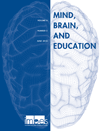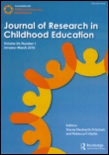
Mind Brain and Education
metrics 2024
Bridging Neuroscience and Learning for a Brighter Future
Introduction
Mind, Brain, and Education is a pioneering journal published by WILEY, focusing on the intersection of cognitive neuroscience, developmental psychology, and educational practices. With an ISSN of 1751-2271 and E-ISSN 1751-228X, this esteemed publication offers a platform for researchers and educators to disseminate innovative findings that bridge theory and practice in learning environments. Spanning from 2008 to 2024, the journal has established a reputation as a vital resource in the academic community, recognized in 2023 as Q2 in Developmental and Educational Psychology and Education, and Q3 in Cognitive Neuroscience and Experimental and Cognitive Psychology. With Scopus ranks demonstrating its impact, especially in Education and Psychology fields, Mind, Brain, and Education invites submissions that advance knowledge and application of educational strategies informed by brain science. Researchers, professionals, and students will find critical insights and collaborative opportunities to enhance educational outcomes and cognitive development in learners.
Metrics 2024
 0.63
0.63 1.90
1.90 2.50
2.50 46
46Metrics History
Rank 2024
Scopus
IF (Web Of Science)
JCI (Web Of Science)
Quartile History
Similar Journals

EUROPEAN JOURNAL OF PSYCHOLOGY OF EDUCATION
Elevating understanding in developmental and educational psychology.Welcome to the European Journal of Psychology of Education, a leading scholarly publication dedicated to advancing the fields of developmental and educational psychology. Published by Springer, this esteemed journal boasts an impressive impact factor, firmly placing it in the Q1 quartile for both Developmental and Educational Psychology as well as Education as of 2023. With a Scopus rank of #171 out of 1543 in Social Sciences Education and a #63 ranking out of 360 in Psychology, it represents a vital resource for researchers, professionals, and students seeking to explore innovative educational practices and psychological theories from a European perspective. Founded in 1986, the journal has established itself as a cornerstone of contemporary research over the years and continues to publish high-quality articles that contribute significantly to the understanding of psychological principles in educational contexts. Although it does not currently operate under an open access model, its rigorous peer-review process ensures that only the most impactful studies are included, making it essential reading for those committed to advancing educational psychology.

COGNITIVE AFFECTIVE & BEHAVIORAL NEUROSCIENCE
Transforming Understanding: The Science Behind Thoughts, Feelings, and ActionsCOGNITIVE AFFECTIVE & BEHAVIORAL NEUROSCIENCE (ISSN: 1530-7026, E-ISSN: 1531-135X) is an esteemed journal published by SPRINGER that aims to advance the understanding of the interplay between cognitive processes, affective states, and behavioral responses in the field of neuroscience. Established in 2001, the journal provides a rigorous platform for disseminating high-quality research, with a significant focus on both Behavioral Neuroscience and Cognitive Neuroscience. Classified in Q1 and Q2 quartiles for 2023, it ranks highly within its categories, holding positions of #37 out of 88 and #46 out of 115 respectively in the Scopus listings. Although not an open-access publication, readers can access a wealth of valuable insights and innovative findings that enrich the scientific community's understanding of brain function and behavior. The journal's emphasis on interdisciplinary research contributes to its esteemed reputation, making it a vital resource for students, researchers, and professionals striving to explore the complex nature of the human mind and behavior.

npj Science of Learning
Unlocking the Secrets of Learning Through Scientific Inquirynpj Science of Learning is a premier, open access journal published by NATURE PORTFOLIO, focusing on the interdisciplinary exploration of learning processes associated with developmental neuroscience and education. Since its inception in 2016, this journal has established itself as a crucial platform for disseminating impactful research, evidenced by its impressive Q1 ranking in Education and Q2 ranking in Developmental Neuroscience as of 2023. Based in the United Kingdom, the journal’s scope encompasses innovative studies that bridge the gap between neuroscience findings and educational practices, making it essential reading for educators, neuroscientists, and scholars alike. With a commitment to advancing knowledge in these fields, npj Science of Learning provides a vital resource that supports both theoretical advancements and practical applications, ensuring that researchers and practitioners can access the latest findings that inform effective learning strategies.

DEVELOPMENTAL NEUROPSYCHOLOGY
Fostering Dialogue for Evolving Neuropsychological PracticesDEVELOPMENTAL NEUROPSYCHOLOGY (ISSN: 8756-5641; E-ISSN: 1532-6942) is a pivotal peer-reviewed journal published by ROUTLEDGE JOURNALS, TAYLOR & FRANCIS LTD in the United Kingdom. Since its inception in 1985, this esteemed journal has been dedicated to advancing the understanding of developmental processes that influence neuropsychological outcomes in children and adolescents. With a focus on the integration of psychological and neuropsychological perspectives, it serves as a vital resource for researchers, clinicians, and educators alike. The journal's current impact factor and its placement in the third quartile for both Developmental and Educational Psychology and Neuropsychology categories underscore its significance in the field, as it ranks in the 45th percentile in both Scopus ranks. While DEVELOPMENTAL NEUROPSYCHOLOGY does not offer open access, it presents crucial research findings and theoretical advancements that cater to professionals seeking to deepen their knowledge and application of developmental neuropsychology until 2024. By fostering dialogue among scholars and practitioners, this journal contributes meaningfully to the ongoing evolution of clinical practices and educational strategies targeting neurodevelopmental trajectories.

AIMS Neuroscience
Advancing neuroscience through open access innovation.AIMS Neuroscience is an esteemed open-access journal published by the American Institute of Mathematical Sciences (AIMS), dedicated to advancing the field of neuroscience since its inception in 2014. With a robust ISSN of 2373-8006 and an E-ISSN of 2373-7972, this journal aims to provide a platform for innovative research and scholarly discourse that spans the diverse and dynamic landscape of the neuroscience discipline. As of 2023, it holds a respectable Q3 category ranking in the miscellaneous neuroscience field and ranks #65 out of 113 in general neuroscience according to Scopus, positioning it in the 42nd percentile for impact. AIMS Neuroscience encompasses a broad scope of topics, from neurobiology and cognitive neuroscience to computational models and neuroengineering, making it a vital resource for researchers, professionals, and students alike. The journal's commitment to open access ensures that cutting-edge research is freely available, fostering collaboration and knowledge sharing within the global neuroscience community.

Journal of Research in Childhood Education
Advancing knowledge in childhood education.The Journal of Research in Childhood Education, published by Routledge Journals, Taylor & Francis Ltd, is a prestigious academic journal that has been at the forefront of childhood education research since its inception in 1986. With an ISSN of 0256-8543 and E-ISSN 2150-2641, this journal serves an essential role in disseminating findings and discussions pertinent to the fields of developmental and educational psychology, as demonstrated by its notable rankings in the 2023 Scopus Ranks, placing it in the 66th percentile of Educational Social Sciences and 49th percentile in Developmental Psychology. With a current Q2 category quartile designation in both Developmental and Educational Psychology and Education, it aims to foster a deeper understanding of the complexities surrounding childhood education practices and policies. Researchers, educators, and students alike will find robust and insightful research that contributes to advancing educational theories and practices, supporting the journal's mission to enhance the overall quality of education for children globally. This journal continues to be a critical resource for individuals passionate about enhancing early childhood education and comprehending the developmental challenges faced by children today.

NEUROBIOLOGY OF AGING
Decoding Neurobiological Mechanisms of AgingNEUROBIOLOGY OF AGING, published by Elsevier Science Inc, is a premier journal dedicated to advancing our understanding of the complex interactions between the aging process and neurobiological mechanisms. With an ISSN of 0197-4580 and E-ISSN 1558-1497, the journal has established itself as a critical resource in the fields of Aging, Developmental Biology, Geriatrics and Gerontology, Clinical Neurology, and Neuroscience. Boasting a Q1 ranking in multiple categories, the journal is positioned within the top echelons of scholarly publication, underscoring its significant impact with an impressive Scopus ranking in various subfields. Committed to disseminating high-quality, peer-reviewed research, NEUROBIOLOGY OF AGING welcomes original articles, reviews, and research notes aiming to uncover the underlying processes of aging on the nervous system, fostering collaboration among researchers, professionals, and students alike. Although primarily subscription-based, the journal continues to play a vital role in shaping the discourse on aging and neurobiology, making it an essential publication for those engaged in this dynamic field.

Cognitive Neurodynamics
Bridging Theory and Practice in Neurodynamics.Cognitive Neurodynamics is a leading journal in the field of cognitive neuroscience, published by Springer in the Netherlands. With an ISSN of 1871-4080 and an E-ISSN of 1871-4099, this journal has established itself as a prominent platform for innovative research from its inception in 2007, continuing to enrich the academic landscape through 2024. Recognized for its significant contributions, Cognitive Neurodynamics holds a Q2 quartile ranking in cognitive neuroscience and impressively ranks #27 out of 115 in the Scopus database, placing it in the 76th percentile among its peers. While the journal is not open access, it offers a wealth of studies focusing on the intricate dynamics of cognitive processes and neurobiological mechanisms, making it essential reading for researchers, professionals, and students alike. Its objective is to bridge the gap between theoretical insights and practical applications, fostering a deeper understanding of cognition through multidisciplinary approaches. Explore the latest advancements in cognitive dynamics and contribute to the evolving dialogue within this fascinating field.

Cognitive Processing
Bridging theory and application in cognitive processes.Cognitive Processing, published by SPRINGER HEIDELBERG in Germany, is a leading journal dedicated to advancing the understanding of cognitive processes through interdisciplinary research. With its ISSN 1612-4782 and E-ISSN 1612-4790, the journal covers a diverse range of fields including Artificial Intelligence, Cognitive Neuroscience, and Experimental and Cognitive Psychology, making it an invaluable resource for researchers and professionals alike. While it currently does not operate under an Open Access model, it is well-regarded within the academic community, holding a respectable impact factor and ranking in the Q2 and Q3 quartiles as of 2023. The journal aims to foster innovation and collaboration among scholars, presenting high-quality original research, reviews, and theoretical discussions that bridge the gap between cognitive science and its practical implications. With a convergence of research from 2005 to 2024, Cognitive Processing continues to play a critical role in the evolving landscape of cognitive science literature.

NEUROPSYCHOLOGY REVIEW
Pioneering Research at the Forefront of Cognitive ScienceNEUROPSYCHOLOGY REVIEW is a prestigious journal published by Springer, dedicated to the exploration of cognitive processes and behavior through neurological and psychological perspectives. With its ISSN 1040-7308 and E-ISSN 1573-6660, this journal holds a distinguished position in Q1 of the Neuropsychology and Physiological Psychology category, ranking at #3 out of 76 with an impressive 96th percentile in Scopus. Since its inception in 1990, it has provided a critical platform for researchers, professionals, and students to disseminate and engage with comprehensive reviews and empirical research, promoting a deeper understanding of the interplay between neural mechanisms and psychological phenomena. Aimed at fostering interdisciplinary collaboration and advancement in the field, NEUROPSYCHOLOGY REVIEW invites contributions that push the boundaries of knowledge and stimulate ongoing debates in neuropsychology, making it an invaluable resource for anyone interested in the latest scientific advancements within this dynamic area.